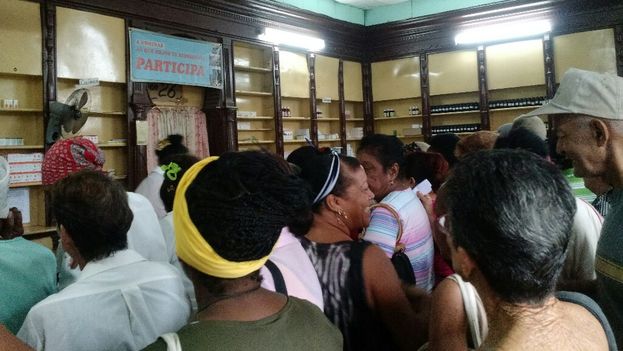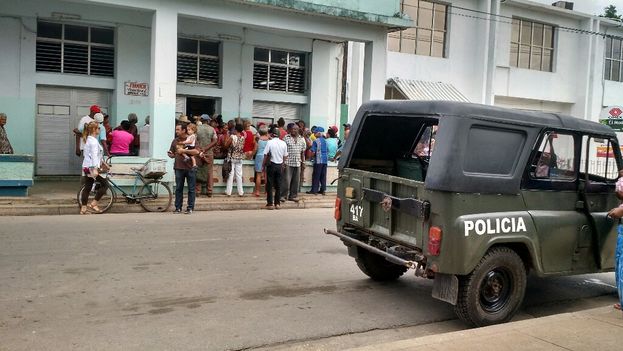
![]() 14ymedio, Bertha K. Guillen, Candelaria, 13 October 2017 — The main pharmacy in Candelaria, a city in Cuba’s Artemisa province, looks like an overturned hornet’s nest when new medications arrive. Meanwhile, the area’s chronically ill spend their days in uncertainty due to the shortage of a growing number of drugs, a situation echoed in the ‘informal’ market.
14ymedio, Bertha K. Guillen, Candelaria, 13 October 2017 — The main pharmacy in Candelaria, a city in Cuba’s Artemisa province, looks like an overturned hornet’s nest when new medications arrive. Meanwhile, the area’s chronically ill spend their days in uncertainty due to the shortage of a growing number of drugs, a situation echoed in the ‘informal’ market.
“There is no Enalapril left or right,” lamented a retiree who waited for several hours this Wednesday to find out if the pills critical to those with hypertension had arrived. “I’m going to have to continue using herbal concoctions,” she lamented.
Since 2015, the deficit of drugs has worsened due to the country’s lack of liquidity. The Biotechnology and Pharmaceutical Industry Group (BioCubaFarma) attributes the problems to the shortages of raw material due to the long-standing non-payment of foreign suppliers.
“We did not have the necessary financing to pay the debts incurred,” Teresita Rodríguez Cabrera, vice president of the group, told the official press in late 2016. The official said that the industry was working to improve supply, but a year later the situation has worsened.
“Six months ago we had 97 drugs missing at this pharmacy,” says an employee of the Candelaria dispensary who prefers anonymity. “In the last three months the figure has reached an alarming number and we are now lacking 157.”
According to this source, analgesics, hypertension pills, diabetes pills, antibiotics and eye drops are among the most affected, “precisely because they are the most in demand.” The employee says that the managers of the branch assured them that the situation would normalize as of September, but the expected return to normal has not materialized.
“As of today, only a few drugs have arrived and in insufficient quantities,” the employee emphasizes.
The medications sold on presentation of a control card, known as a tarjetón,
are among those in shortest supply. The State subsidizes all pharmaceutical products and regulates the quantities that each consumer can buy, even when it comes to medications that don’t require a prescription.

In the small villages near Candelaria several pharmacies have closed their doors permanently due to the lack of supply, which overloads the dispensaries that remain in operation.
The administration of the Municipal Main Pharmacy has taken measures to avoid the crowds that form when supplies arrive. These guidelines also seek to curb the hoarding of products, many of which end up on the black market.
This Wednesday, outside the pharmacy a hive of customers tried to reach the counter, screaming and shoving. In a near brawl won by the strongest, people with disabilities, pregnant women and the elderly had to retreat to avoid getting elbowed.
The pharmacy workers responded by closing the place down and calling the police to restore order. Buyers who clustered at the small window to ask questions also received no response and for hours no employee picked up the phone.
The pharmacy administration is determined to sell only one prescription of each drug per person, a decision that bothered those like Milagros, 64, who stood in line from nine o’clock on Tuesday night and had hoped to receive enough medication to last until the next supplies came in.
A few blocks away, the Catholic church also lacks the supplies to meet the demand for medicines. For several years the parishes have supplied the needy with non-prescription products that come from donations from abroad. In the last half year, however, the arrival of these donations has also declined.
“For months we’ve gotten nothing more than vitamins and some other things and those only in small quantities,” Olimpia, the women in charge of drug distribution at the Artemis church, tells 14ymedio. Hurricane Irma has affected many provinces of the country, causing much of the aid to be channeled to those areas.
In these circumstances, many Candelarians settle for trying to relieve their skin itches or lower their blood pressure through the traditional infusions that their grandmothers abandoned years ago.
